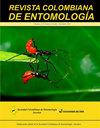利用广义线性模型对油棕中钩头鱼(半翅目:钩头鱼科)进行计数
IF 0.3
4区 农林科学
Q4 ENTOMOLOGY
引用次数: 1
摘要
对来自事件计数的数据进行分析时,必须考虑使用适合处理这类变量的工具。解决这一问题的有效方法是使用广义线性模型(GLM)。使用GLM可以处理密度函数,如泊松函数或负二项函数。这项工作介绍了在哥伦比亚巴兰卡伯梅哈市塞尼帕玛研究站进行的一项实验数据分析的结果。本试验旨在实地评价昆虫病原真菌紫丁香紫霉(Purpureocillium lilacinum)对彩蝽(Leptopharsa gibbarina)种群的控制效果。试验分2个样地进行,其中1个样地采用紫丁香假单胞菌(P. lilacinum)防治褐飞虱(L. gibicarina), 2个样地无防治策略。采用GLM和两种不同的密度函数(泊松函数和负二项函数)对数据进行分析。结果显示两组间差异有统计学意义。最大似然估计值表明,紫丁香花菌处理使白僵菌种群数量减少,发生率为对照的0.28倍。本文章由计算机程序翻译,如有差异,请以英文原文为准。
Uso de modelos lineales generalizados en el conteo de Leptopharsa gibbicarina (Hemiptera: Tingidae) en palma de aceite
The analysis of data coming from the counting of events must consider tools that are appropriate to deal with this type of variable. A valid approach to cope with this task consists of using the Generalized Linear Model (GLM). The use of GLM allows working with density functions such as Poisson or Negative Binomial. This work presents the results of analyzing the data from an experiment carried out at the Research Station of Cenipalma located in the municipality of Barrancabermeja (Colombia). The experiment was established to evaluate, at the field level, the entomopathogenic fungus Purpureocillium lilacinum as a strategy to control the population of the lace bug, Leptopharsa gibbicarina. The experiment was carried out in two plots, in one of them, the control of L. gibbicarina with P. lilacinum was implemented as suggested by the Entomology research program of Cenipalma and, in the other plot there was no control strategy. The data were analyzed by using GLM and two different density functions (Poisson and the negative binomial). Results showed statistically significant differences between the treatments. The estimator of the maximum likelihood associated with the P. lilacinum treatment indicated that the application of the entomopathogenic fungus reduced the populations of L. gibbicarina with a rate of incidence of 0.28 times more than the control.
求助全文
通过发布文献求助,成功后即可免费获取论文全文。
去求助
来源期刊
CiteScore
0.90
自引率
0.00%
发文量
25
审稿时长
>12 weeks
期刊介绍:
The Revista Colombiana de Entomología (Rev. Colomb. Entomol.) is the official scientific publication of the Colombian Society of Entomology - SOCOLEN since april of 1975. The journal is published twice a year. Contributions include Original Research Papers, Reviews of Entomological Topics (under a request from the Editorial Board), Taxonomic Papers, Points of View, New Records, Scientific Notes, Book Reviews, and Obituaries. The Revista Colombiana de Entomología welcomes contributions from both national and international researchers, and from members or non-members of the Society. Paper acceptance will depend on the evaluation of national and international academic peers. Manuscripts submitted for publication may be written in Spanish or English.

 求助内容:
求助内容: 应助结果提醒方式:
应助结果提醒方式:


